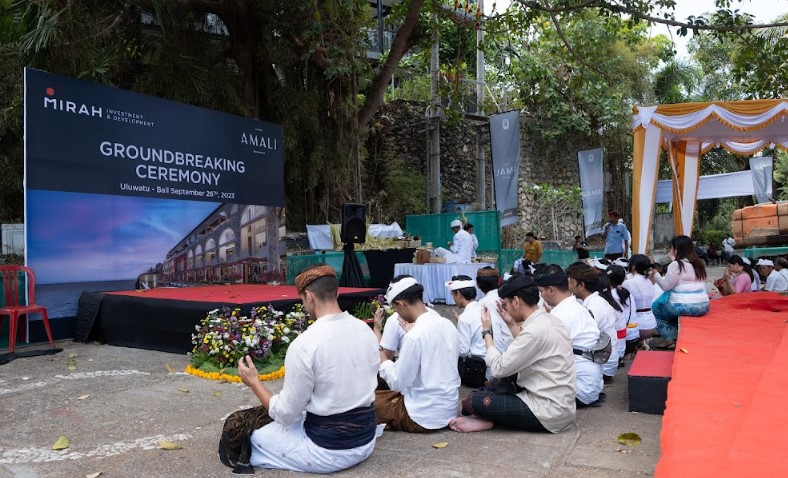They’re coming over here, they’re taking our jobs, and they don’t even speak English—let alone Indonesian.
For decades, the inhabitants of Bali, Indonesia, have had tourists flock to their island. Locals have long grumbled quietly about misbehaving visitors and increasingly overwhelming numbers, but the huge number of jobs tied to the industry meant these sentiments remained muted. A recent wave of Russians, however, has sparked a rush of complaint. The number of those arriving is still well below pre-pandemic levels, but unlike the short-stay tourists of the past, many of the new arrivals are settling in for the long haul—looking to escape potential conscription and Russia’s bleak domestic situation.
On March 14, Bali Gov. I Wayan Koster asked the central government to stop Russians and Ukrainians from receiving visas-on-arrival. He also plans to ban foreigners from renting motorbikes. Currently, the Indonesian central government seems disinclined to agree, but these moves reflect the growing frustration felt by Bali’s locals.
Many of the allegations made against the Russians—drunkenness, disrespect of local culture, and dangerous driving—have long been leveled against visitors from across the world. However, Russians are widely seen as particularly egregious offenders. “The Australians also cause problems, that’s for sure, but they are just drunk persons,” said Deedee Sinaga, who works at a Bali tourism agency. (Australians are Bali’s most frequent visitors.) “Whatever they do it’s just childish naughtiness, kind of annoying but that’s about it. But the Russians—no, they think they own the place.”
For frustrated Balinese, Instagram has become the place to vent. Whenever a post showing bad behavior goes viral, Sinaga said, “nine times out of ten it’s Russians.” Angry comments quickly follow. A recent post—since deleted—by a Russian man showing himself bearing his buttocks on Mount Agung, considered sacred by locals, attracted particular ire.
Odcek Ariawan, a Bali native and event organizer, said he thought the problem was partly that many of the newly arrived Russians are inexperienced travelers, unused to adapting to local mores.
Others have a blunter assessment. “They’re fucking savages,” said Anton, himself a native of Moscow who left in 2014 for political reasons. He settled in Bali in August 2022. Anton described many Russians abroad as “badly educated; speaking no English at all; and pretending that wherever they are, they are not guests.”
Odcek also suggested that things might be easier if more Russians spoke English, the lingua franca for interactions between Balinese and foreigners.
Further sharpening the resentment is that, with no end to Russia’s invasion of Ukraine in sight, many Russians are settling in and finding jobs. One particularly popular Instagram account, now apparently taken down, focused on reposting ads for businesses suspected of being operated by Russians.
Bali is no stranger to foreigners setting up businesses or working remotely without the proper paperwork. What is new is that many Russians are now working in industries locals see as their own. “They are doing manicure and pedicure; can you imagine?” Sinaga said. “They are doing barbershops. This is not an online job.”
A well-placed Ukrainian, who asked for anonymity, speculated that the slow establishment of relatively self-contained Russian communities in Bali over the years, and a dip in the cost of living during the pandemic, may have played a role in the rise of everyday employment opportunities for Russians. Now, the Ukrainian suggested, less-affluent Russians can come to Bali and make a living providing services to their richer compatriots.
Amid the tensions, Niluh Djelantik, an internationally renowned shoe designer who started a tip line for illegally operated businesses, has emerged as a key figure. Although a stickler for the rules, she has also worked to soothe tensions where possible—even arranging for the infamous mooning Russian to publicly apologize and participate in a cleansing ceremony. When it comes to jobs, she wants to pair enforcement with reform. Foreigners should secure proper permissions to work and pay taxes, but the government should also clarify the rules for remote workers, she told Foreign Policy.
The provincial government is taking a blunter approach. Noise is being made about a crackdown on people working without a visa, especially in sensitive jobs. Meanwhile, there are plans to offer a “Second Home” visa to those who can show a bank account with a balance equivalent to 2 billion Indonesian rupiah—about $140,000.
For some Russians such as Shagor, who preferred to use only his first name, this seems fair. Shagor was careful to obtain an investor visa and legally set up a tourism company in Bali, he said. But for others, such as Anton (notwithstanding his criticism of other Russians), the restrictions on recent runaways seem harsh. “I cannot blame these people for trying to make some money to survive,” Anton said. “Some of them have children.” Anton’s own work as a remote IT consultant doesn’t even let him accumulate any savings, he claims.
This is what makes the proposed ban of visas-on-arrival so worrying for people like Anton. Unable to qualify for more expensive visas or pay for the services of the various visa fixers common on the island, he flies to Kuala Lumpur, Malaysia, and back to renew his visa every 60 days.
“Most of my compatriots are the same,” he said. “They can only afford a visa-on-arrival, so every two months we have to go for visa runs and pray that they will let us back.”
Meanwhile, Ukrainians in Bali seem less worried about the proposed visa changes, but resent being lumped in with Russians. Anastasiia Marushevska, who moved from Ukraine to Bali in 2018, said getting rid of visas-on-arrival shouldn’t make a problem for her or many other Ukrainians. Most arrived before the war and have relatively stable residency arrangements, she claimed.
Still, Marushevska said she saw including Ukrainians in the proposed policy as a ham-fisted attempt at seeming neutral with regards to the war. In fact, she argued, it only encourages locals to group Ukrainians with Russians—mirroring Russian propaganda and making Ukrainians seem like accomplices to Russian misdemeanors. Marushevska was keen to insist that few Ukrainians were taking up jobs in areas that the Balinese see as theirs.
For Djelantik, though, this isn’t the point. “I don’t want people to get arrested opening their laptop in a coffee shop,” she said. But, she argued, if Indonesians must file proper paperwork when working abroad, surely the same should apply to foreigners working in Indonesia?





More Stories
Menghormati Tradisi dan Lingkungan: Proyek Properti Berkelanjutan di Bali dimulai dengan Upacara Adat Setempat
Escape Bali into Nature
Top 3 Comeback Destinations Of The Year For American Travelers